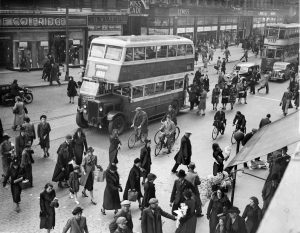The next day we were taken to the main airport and put on another Dakota bound for England. At 5 p.m. that evening we landed in Aylesbury. It was a beautiful spring day and as we got off the aircraft we fell to our knees and touched our own land for the first time. We had survived that most hazardous of all moments in history – the final desperate hours of a dying country.
There was a welcoming party of R.A.F. and W.R.A.F. in one of the Airfield hangars, but after a short period of tea-drinking and listening to speeches we climbed in to Army trucks and were taken off to a camp close by. We assumed that we would be given immediate leave and would be home within twenty-four hours. Our hopes were quickly dashed. We found ourselves once more under armed guard – this time, of course, by our own side, and we had to accept that the process of interrogating and classifying former P.O.Ws. was going to take some considerable time. We were not allowed out, but were well fed and reasonably housed in barrack blocks. The interrogation was quite interesting. I was asked such questions as, “Could you have avoided being taken prisoner?” Did you try to escape?” and told, “Don’t forget the war isn’t over yet.”
After a couple of weeks we were eventually given leave – six weeks with double rations.’ It was almost unbelievable. I arrived at my parents’ home near Manchester at about 4 o’clock one afternoon. My mother, whom I had telegraphed – we had no telephone – was so staggered to see me that she was literally unable to speak for almost an hour. I was very thin and had no real appetite, but I was otherwise healthy. Our neighbours had gathered to see the returned prisoner and they very kindly brought gifts of food from their meagre rations. My sister and brother did well out of this as I simply couldn’t eat much. My mother had saved up all the family news, but unfortunately I had already heard a good deal of it from a neighbour who had travelled on the same bus as me from Exchange Station in Manchester. I don’t think Mother ever forgave this woman for telling me that my sister was married and that my brother had lost an eye.

This is a street scene in Manchester sometime in the 1940s. Dad probably came home from the station on a bus like this.